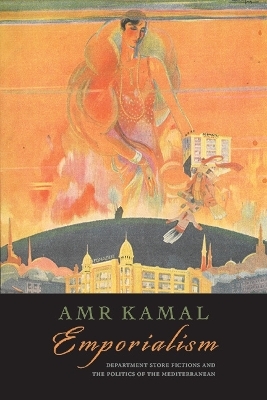
Emporialism
Department Store Fictions and the Politics of the Mediterranean
Seiten
2024
State University of New York Press (Verlag)
978-1-4384-9947-5 (ISBN)
State University of New York Press (Verlag)
978-1-4384-9947-5 (ISBN)
A comparative study of iconographic and fictional representations of department stores in France and Egypt, as sites of imperial and Mediterranean cultural memory, from 1869 to the present.
This book examines what Amr Kamal calls the phenomenon of emporialism, or the convergence between the spaces and imaginaries of empires and emporia in the context of a modern Mediterranean divided among the British, French, and Ottoman empires. By "emporia," Kamal refers to the commercial network of nineteenth-century department stores, which gained prominence after the Suez Canal project. Taking as a focal point French and Egyptian department stores, the author examines emporialism as a set of phenomenological experiences, discursive and social praxes, and mechanisms of control and resistance, born from the intersection of modernity, colonialism, and mass consumption. Drawing on archival evidence, Kamal reads iconographic and literary representations of emporia in English, French, Arabic, and Hebrew, from the nineteenth century to the present, addressing works by Émile Zola, Huda Shaarawi, Jacqueline Kahanoff, and others. Emporialism, Kamal argues, served to rewrite the history of the Mediterranean, to reinvent national belonging, and to interrogate issues of modernity and social justice.
This book examines what Amr Kamal calls the phenomenon of emporialism, or the convergence between the spaces and imaginaries of empires and emporia in the context of a modern Mediterranean divided among the British, French, and Ottoman empires. By "emporia," Kamal refers to the commercial network of nineteenth-century department stores, which gained prominence after the Suez Canal project. Taking as a focal point French and Egyptian department stores, the author examines emporialism as a set of phenomenological experiences, discursive and social praxes, and mechanisms of control and resistance, born from the intersection of modernity, colonialism, and mass consumption. Drawing on archival evidence, Kamal reads iconographic and literary representations of emporia in English, French, Arabic, and Hebrew, from the nineteenth century to the present, addressing works by Émile Zola, Huda Shaarawi, Jacqueline Kahanoff, and others. Emporialism, Kamal argues, served to rewrite the history of the Mediterranean, to reinvent national belonging, and to interrogate issues of modernity and social justice.
Amr Kamal is Associate Professor of French, Arabic, and Comparative Literature at the City College of New York and the CUNY Graduate Center.
List of Illustrations
Notes on Translation and Transliteration
Acknowledgments
Introduction
1. Emporialism in the Footsteps of Empire
2. Emporialism at the Crossroads of Empires
3. An Empire of Values: The Emporium in Zola's Au Bonheur des dames
4. Modeling Empire: Emporialism and Transnational Feminism
5. Jacqueline Kahanoff 's Jacob's Ladder: Between Emporialism and Levantinism
6. Neo- Emporialism and the Politics of Memory
Notes
Works Cited
Index
| Erscheinungsdatum | 24.09.2024 |
|---|---|
| Zusatzinfo | Total Illustrations: 58 |
| Verlagsort | Albany, NY |
| Sprache | englisch |
| Maße | 152 x 229 mm |
| Gewicht | 227 g |
| Themenwelt | Geisteswissenschaften ► Geschichte ► Regional- / Ländergeschichte |
| Geisteswissenschaften ► Sprach- / Literaturwissenschaft ► Anglistik / Amerikanistik | |
| Geisteswissenschaften ► Sprach- / Literaturwissenschaft ► Literaturwissenschaft | |
| ISBN-10 | 1-4384-9947-7 / 1438499477 |
| ISBN-13 | 978-1-4384-9947-5 / 9781438499475 |
| Zustand | Neuware |
| Haben Sie eine Frage zum Produkt? |
Mehr entdecken
aus dem Bereich
aus dem Bereich
Universalgelehrter, Polarreisender, Entdecker
Buch | Hardcover (2024)
mareverlag
28,00 €


